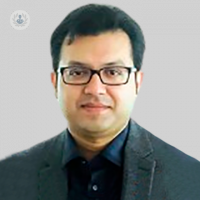Zio® by iRhythm Technologies: How AI technology has improved arrhythmia pathways
Written in association with:The use of an AI-powered heart monitoring, called Zio® by iRhythm Technologies, has helped clinicians redesign pathways for the care of arrhythmia.
Here, Dr Saeedur Rahman, renowned consultant stroke and internal medicine specialist, provides an expert insight into Zio®.

How is arrhythmia typically diagnosed?
Atrial fibrillation is the most prevalent form of arrhythmia, a condition characterised by an irregular heartbeat that’s too fast, too slow, or with an irregular rhythm. Arrhythmia is a leading cause of stroke, and often poses challenges in diagnosis.
Patients suspected of having atrial fibrillation are commonly asked to use heart monitoring devices to identify irregular heart rhythms. However, this process can become complex when it comes to paroxysmal atrial fibrillation, as symptoms may be intermittent.
Usually, traditional ECG monitors (called Holter monitors) are worn for either 24 hours or a maximum of seven days. As a result, if a patient doesn’t show abnormal rhythms during this time frame, the condition could remain undiagnosed. Moreover, Holter monitors can be inconvenient, which can lead to low patient comfort and compliance. Additionally, managing Holter monitors can also be labour-intensive for hospital staff, as cardiac physiologists must manually analyse extensive ECG data collected by the devices.
How did you use the Zio® service in your practice?
My team and I identified the need for an intermediate level of rhythm monitoring that falls between a 12-lead ECG and an implantable loop recorder (ILR). With this in mind, we decided to redesign our pathway to include an additional option before considering the IRL. Our aim was to acquire a monitoring device that would fill the space between a traditional ECG monitor and an ILR.
The team discovered the Zio® XT service provided by iRhythm Technologies, an advanced AI-enabled ECG monitoring solution. This service consists of a single-use Zio® heart monitor, which is affixed to the patient’s chest and worn for a duration of up to 14 days. Following this period, Zio® uses AI algorithms to analyse the data collected by the monitor, after which Zio generates a high-quality, actionable ECG report.
What are the benefits of the Zio® service?
The Zio® service enhances the detection of arrhythmias, helping redesign the arrhythmia care pathway. This is because longer monitoring times contribute to higher pick-up rates and fewer false readings, thereby improving effectiveness.
The redesigned pathway also offers additional advantages. Firstly, the Zio® XT device is smaller and showerproof, in contrast to traditional Holter monitors, which can lead to increased patient comfort and compliance. Secondly, datasets are analysed by AI alongside iRhythm's team of cardiac physiologists, resulting in faster diagnoses and reduced workload on hospital staff.
Overall, this is beneficial for patients requiring prompt treatment, since they are diagnosed faster compared to standard Holter monitor practices. Potentially, this can lower the risk of secondary strokes as well as the associated expenses. Additionally, it also benefits the NHS by improving capacity and productivity, thereby reducing the need for repeat tests.
Clinicians must utilise the Zio® service within the appropriate context and integrate it into a highly structured pathway. Our success stemmed from thorough planning and a close partnership with iRhythm to ensure adequate staff training and continuous evaluation of our progress.
If you would like more information about Zio® by iRhythm Technologies, or require expert stroke and internal medicine care, schedule an appointment with Dr Saeedur Rahman via his Top Doctors profile today.


